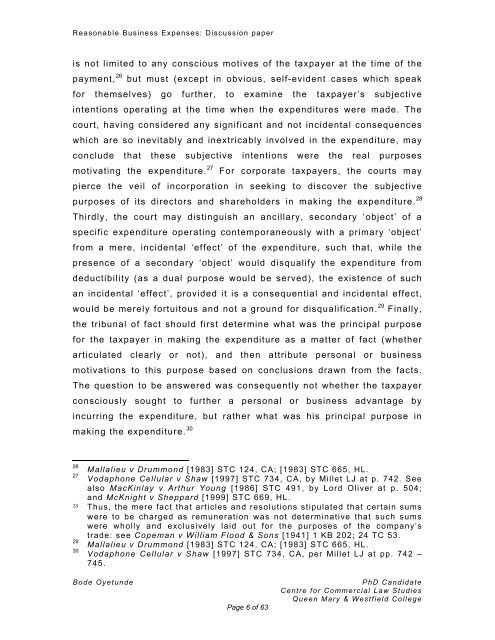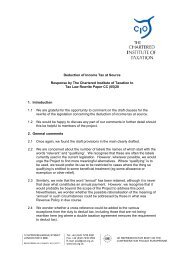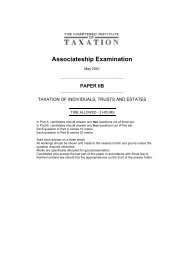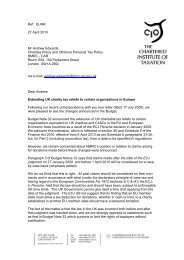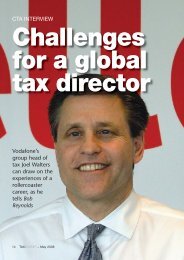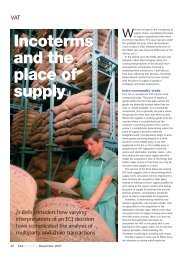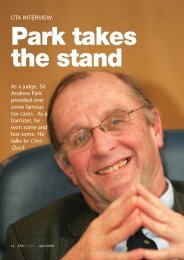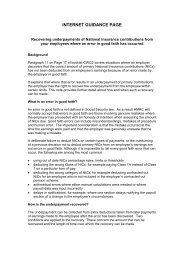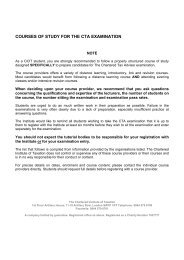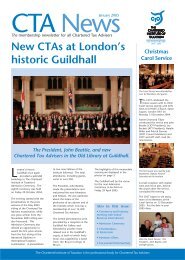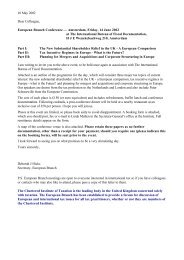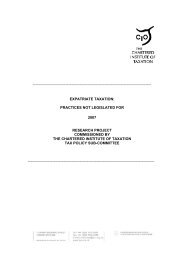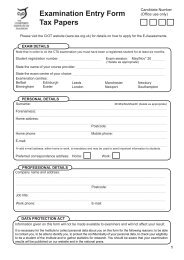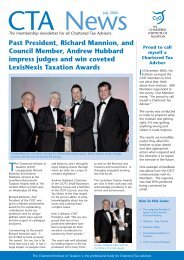Reasonable Business Expense - The Chartered Institute of Taxation
Reasonable Business Expense - The Chartered Institute of Taxation
Reasonable Business Expense - The Chartered Institute of Taxation
Create successful ePaper yourself
Turn your PDF publications into a flip-book with our unique Google optimized e-Paper software.
<strong>Reasonable</strong> <strong>Business</strong> <strong>Expense</strong>s: Discussion paperis not limited to any conscious motives <strong>of</strong> the taxpayer at the time <strong>of</strong> thepayment, 26 but must (except in obvious, self-evident cases which speakfor themselves) go further, to examine the taxpayer’s subjectiveintentions operating at the time when the expenditures were made. <strong>The</strong>court, having considered any significant and not incidental consequenceswhich are so inevitably and inextricably involved in the expenditure, mayconclude that these subjective intentions were the real purposesmotivating the expenditure. 27 For corporate taxpayers, the courts maypierce the veil <strong>of</strong> incorporation in seeking to discover the subjectivepurposes <strong>of</strong> its directors and shareholders in making the expenditure. 28Thirdly, the court may distinguish an ancillary, secondary ‘object’ <strong>of</strong> aspecific expenditure operating contemporaneously with a primary ‘object’from a mere, incidental ‘effect’ <strong>of</strong> the expenditure, such that, while thepresence <strong>of</strong> a secondary ‘object’ would disqualify the expenditure fromdeductibility (as a dual purpose would be served), the existence <strong>of</strong> suchan incidental ‘effect’, provided it is a consequential and incidental effect,would be merely fortuitous and not a ground for disqualification. 29 Finally,the tribunal <strong>of</strong> fact should first determine what was the principal purposefor the taxpayer in making the expenditure as a matter <strong>of</strong> fact (whetherarticulated clearly or not), and then attribute personal or businessmotivations to this purpose based on conclusions drawn from the facts.<strong>The</strong> question to be answered was consequently not whether the taxpayerconsciously sought to further a personal or business advantage byincurring the expenditure, but rather what was his principal purpose inmaking the expenditure. 3026Mallalieu v Drummond [1983] STC 124, CA; [1983] STC 665, HL.27Vodaphone Cellular v Shaw [1997] STC 734, CA, by Millet LJ at p. 742. Seealso MacKinlay v Arthur Young [1986] STC 491, by Lord Oliver at p. 504;and McKnight v Sheppard [1999] STC 669, HL.28 Thus, the mere fact that articles and resolutions stipulated that certain sumswere to be charged as remuneration was not determinative that such sumswere wholly and exclusively laid out for the purposes <strong>of</strong> the company’strade: see Copeman v William Flood & Sons [1941] 1 KB 202; 24 TC 53.29Mallalieu v Drummond [1983] STC 124, CA; [1983] STC 665, HL.30Vodaphone Cellular v Shaw [1997] STC 734, CA, per Millet LJ at pp. 742 –745.Bode OyetundePage 6 <strong>of</strong> 63PhD CandidateCentre for Commercial Law StudiesQueen Mary & Westfield College


